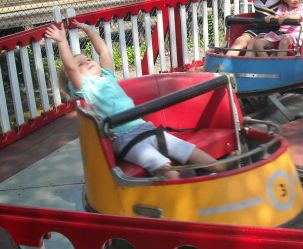Post by misty on Mar 3, 2008 19:28:07 GMT -5
This is from a newsletter I receive in my email. I thought it was interesting enough to post, especially since so mny of us have teens or soon to be teens.
NEWSLETTER
I have heard many stories over the years of kids who have been on their medications for ADHD for many years reaching their adolescent years and beginning to resist taking them or stop taking them altogether. Many of them complain that they are tired of taking them or that they view them as some mind control drug that their parents and teachers have had them on.
During this time of change in their lives it is probably understandable why in their search for who they are they may want to know what they are without medication. Some of them may quickly realize that their medication was helping them and go back on it. Others like many adults may not see any changes to how they feel even though all those around them know there has been some change, most often to the downside. There is also the great converging of hormones and independence at this time in their lives that results in considerable blurring in the lines between ADHD and independent rebellion. These changes in both areas can be very dramatic or somewhat gradual and its often difficult to separate them out.
In the older days before time release medications more kids had to go to the school office to take their medications and over a short period of time it didn't take their classmates long to figure out who was going to the office for their medication. But even since the time many of them have been taking medication not required to be taken during school hours most ADHD kids who experience more difficult symptoms have been identified by their peers as different.
The danger that accompanies this self imposed vacation from their medication is that often this is the same time they are increasingly exposed to illegal street drugs many of which may duplicate the way they felt on their legal, parental approved, teacher advocated medications. They often will justify the use of the illegal drug or alcohol abuse as being THEIR decision. Although this probably makes no sense to adults it is easy for a adolescent to justify this as they attempt to make their own decisions on their lives.
As a probation officer I remember going back and looking at many of my ADHD clients whose pre-sentence investigation had shown a diagnosis of ADHD and treatment with prescribed stimulants who told the investigator that they stopped taking their medication at 14 years old, and that corresponded exactly to the beginning of their juvenile rap sheet and beginning of involvement in the criminal justice system. As I wrote in my book most people with ADHD do not get involved in the criminal justice system, but there certainly is a greater chance of involvement if you have ADHD. Impulsive behavior, low self esteem due to past struggles, the paradox of doing well at some areas and failing in others, the knowledge that you are more intelligent than you have been able to demonstrate as well as many other factors can increase the chance of poor decision making.
Often times having ADHD makes you want to gravitate to others who have it or the so called outcast groups in school. Birds of a feather flock together kicks in and risk taking and rebellion are often exciting alternatives for kids during this part of their lives.
I think many kids, especially those who started medication in kindergarten or fiirst grade have not been adequatley informed or kept up to date on the reasons for taking their medications. So dialogue and listening to your kids is very important. I am not a big believer in taking drug holidays but they do serve a useful education purpose in allowing a child to experience life off their medication when accompanied with a understanding that discussion can occur between them and their parents over how they feel and how they impact the family in both positive and negative ways when not medicated.
So if your child is resistant don't just dismiss their concerns and demand compliance. Start a dialogue and consider setting some guidelines and time frames where you will consider letting them take some Holidays from medication in conjunction with their health providers. Many of them may see the results immediatly for themselves, others will be more challenging.
Its important to keep the lines of communication open so that they don't make this decision unilaterally and without anyone's knowledge. Watch for signs of sudden behavior change and try and distinguish normal teenage independence seeking from their ADHD, again this is not easy so talking to them is vital. Don't be confrontational about it, be open, aware and involved. If neccesary assume your role as a parent to intervene if it starts to move downhill in a rapid manner.
Good luck as you go through or support someone else going through this time period in a persons life.
Thanks and talk to you next month.
Patrick Hurley
addcorridorcoach@aol.com
If you know on anyone who might like this newsletter, please forward it to them, and tell them to go to my web site at www.addcorridorcoaching.com and sign up.
NEWSLETTER
I have heard many stories over the years of kids who have been on their medications for ADHD for many years reaching their adolescent years and beginning to resist taking them or stop taking them altogether. Many of them complain that they are tired of taking them or that they view them as some mind control drug that their parents and teachers have had them on.
During this time of change in their lives it is probably understandable why in their search for who they are they may want to know what they are without medication. Some of them may quickly realize that their medication was helping them and go back on it. Others like many adults may not see any changes to how they feel even though all those around them know there has been some change, most often to the downside. There is also the great converging of hormones and independence at this time in their lives that results in considerable blurring in the lines between ADHD and independent rebellion. These changes in both areas can be very dramatic or somewhat gradual and its often difficult to separate them out.
In the older days before time release medications more kids had to go to the school office to take their medications and over a short period of time it didn't take their classmates long to figure out who was going to the office for their medication. But even since the time many of them have been taking medication not required to be taken during school hours most ADHD kids who experience more difficult symptoms have been identified by their peers as different.
The danger that accompanies this self imposed vacation from their medication is that often this is the same time they are increasingly exposed to illegal street drugs many of which may duplicate the way they felt on their legal, parental approved, teacher advocated medications. They often will justify the use of the illegal drug or alcohol abuse as being THEIR decision. Although this probably makes no sense to adults it is easy for a adolescent to justify this as they attempt to make their own decisions on their lives.
As a probation officer I remember going back and looking at many of my ADHD clients whose pre-sentence investigation had shown a diagnosis of ADHD and treatment with prescribed stimulants who told the investigator that they stopped taking their medication at 14 years old, and that corresponded exactly to the beginning of their juvenile rap sheet and beginning of involvement in the criminal justice system. As I wrote in my book most people with ADHD do not get involved in the criminal justice system, but there certainly is a greater chance of involvement if you have ADHD. Impulsive behavior, low self esteem due to past struggles, the paradox of doing well at some areas and failing in others, the knowledge that you are more intelligent than you have been able to demonstrate as well as many other factors can increase the chance of poor decision making.
Often times having ADHD makes you want to gravitate to others who have it or the so called outcast groups in school. Birds of a feather flock together kicks in and risk taking and rebellion are often exciting alternatives for kids during this part of their lives.
I think many kids, especially those who started medication in kindergarten or fiirst grade have not been adequatley informed or kept up to date on the reasons for taking their medications. So dialogue and listening to your kids is very important. I am not a big believer in taking drug holidays but they do serve a useful education purpose in allowing a child to experience life off their medication when accompanied with a understanding that discussion can occur between them and their parents over how they feel and how they impact the family in both positive and negative ways when not medicated.
So if your child is resistant don't just dismiss their concerns and demand compliance. Start a dialogue and consider setting some guidelines and time frames where you will consider letting them take some Holidays from medication in conjunction with their health providers. Many of them may see the results immediatly for themselves, others will be more challenging.
Its important to keep the lines of communication open so that they don't make this decision unilaterally and without anyone's knowledge. Watch for signs of sudden behavior change and try and distinguish normal teenage independence seeking from their ADHD, again this is not easy so talking to them is vital. Don't be confrontational about it, be open, aware and involved. If neccesary assume your role as a parent to intervene if it starts to move downhill in a rapid manner.
Good luck as you go through or support someone else going through this time period in a persons life.
Thanks and talk to you next month.
Patrick Hurley
addcorridorcoach@aol.com
If you know on anyone who might like this newsletter, please forward it to them, and tell them to go to my web site at www.addcorridorcoaching.com and sign up.





